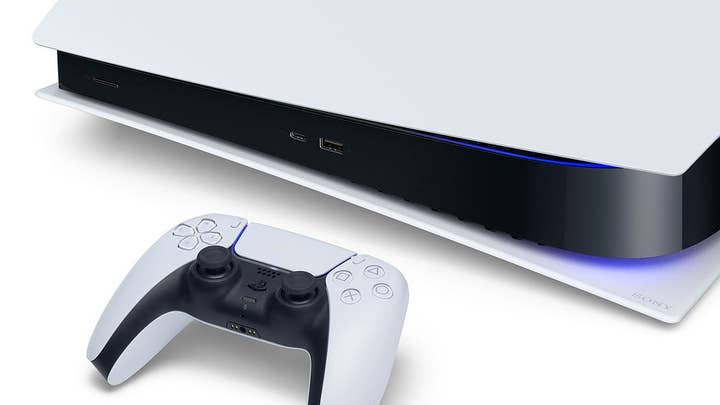Why it's impossible to track console sales in China
Sony says PS5 has sold 670,000 units in mainland China, but consultant suggests imports likely put it closer to 1.5 million
Earlier this year, Sony announced it has sold 670,000 PlayStation 5 units in mainland China – but the actual install base is almost certainly much higher.
Like individual video games, consoles must be approved for release in China. For decades, home consoles were banned in the region but since 2015, Sony, Microsoft and Nintendo have been able to release versions of their devices to one of the world's biggest games markets, albeit often with restrictions on features and content.
The 670,000 sales announced by Sony – originally announced during an investors briefing in May, and reiterated around the news that Sony is expanding its incubator for Chinese developers – will only encompass the officially released model.
But the import scene in China means the standard model of the PS5 is widely available in the country, purchasable via online marketplaces like Taobao and even 'grey market' physical retail stores.
"It’s simply too easy and convenient to buy an imported PS5, and then continue to buy imported games unrestricted"
Daniel Camilo, consultant
In fact, the PS5 did not launch in China until May 2021 – six months after its international launch – meaning importers would have had their hands on the console before Sony even recorded an official sale. And the Xbox Series X|S did not launch until June, so its total sales figures will be similarly affected.
"The conundrum is in figuring out how many of those imported consoles are effectively sold in China," Shenzhen-based games consultant Daniel Camilo tells GamesIndustry.biz. "The fact is, nobody knows exactly. The best we can do is guess and speculate."
Camilo previously wrote about the impact of imports on the Chinese launch of Nintendo Switch. Most imported consoles come from Japan, Hong Kong and Taiwan, he says, but some come from the USA and other regions – and such sales will be counted within those regions.
"So if Sony sells, say, one million units in Japan, we can be certain that a portion of those units are actually being distributed in China to Chinese consumers, and ultimately do not reflect the real install-base of consoles in Japan," Camilo explains.
"How big is that portion? Virtually impossible to know. The network of distributors and scalpers who divert shipments to China is too wide and diverse, and once the units land in China, they are sold through hundreds of different sellers across the country. There is at this time no tracking body or method capable of effectively tracking these units."
But while it's impossible to know for certain, Camilo says there are methods by which you can estimate how many imported units are sold in China through a combination of:
- How many imported models are listed on online stores
- Tracking price fluctuations (which he says are often an indicator of both consumer demand, and stock availability)
- Direct conversations with sellers
"The consistent feedback I get is that imported models vastly outsell the Chinese models," he adds. "This is in spite of the price for imports being higher than the local ones."
Based on this, Camilo estimates that imported consoles sell at least three times more units than the official China models, adding that he believes at least 1.5 million PS5 units have been sold in mainland China across all models.
"Since launch, demand for PS5 in China has been high, and the influx of stock has been almost constant"
Daniel Camilo, consultant
"Since launch, demand for the console in the country has been high, and the influx of stock has been almost constant," he explains. "While hard to precise a number, all signs indicate the total real amount of PS5 consoles in China to be considerably higher than even Sony can account for from its distributors and its licensed Chinese model."
As for why Chinese gamers are more likely to buy an imported PS5 rather than the official model – especially with the high price tag – Camilo puts it down to the desire for the full experience.
"Chinese gamers who are even just mildly well informed know that officially licensed and/or distributed gaming hardware, software, and digital platforms/stores in China have their content and ability to run content limited by Chinese regulators and respective guidelines," he explains. "Meaning, everything can and/or will have censored content, potentially limiting the enjoyment of its users.
"In the specific case of Chinese console models, limitations are usually found in their digital infrastructure, with either online models being disabled for some games, and/or digital stores having a very reduced amount of games and services available when compared to international standards.
"Knowing this, many Chinese gamers will naturally lean towards imported consoles, for both the PS5, but also other ones such as the Nintendo Switch and the Xbox Series X/S. It's simply too easy and convenient to buy an imported PS5 that most online sellers have in stock, and then simply continue to buy imported games, both physically or digitally, unrestricted.
"Unless Chinese authorities decide to actively ban imported models and impose severe restrictions to its sellers, the local models will remain in a position where they are seen as too much of a compromise. They can't compete with the better ('normal') version of themselves, which are also available to everyone."
Earlier this year, Niko Partners estimated that imports account for 80% of console software and services revenue in China, with the country's console market expected to pass $2 billion this year.

